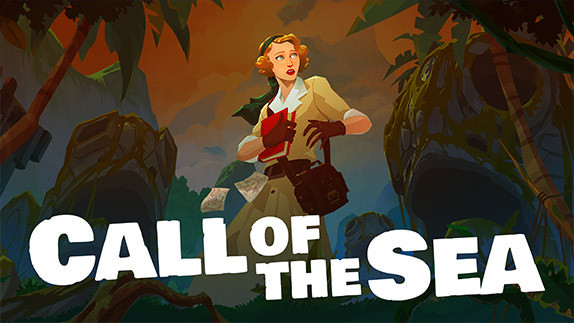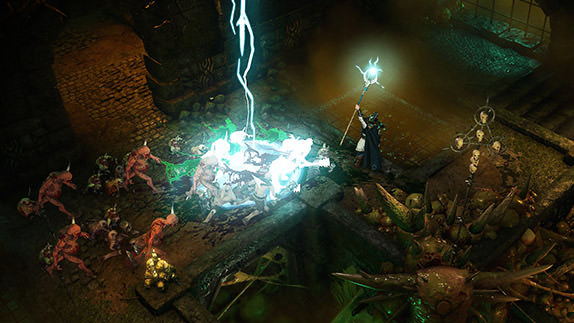Transistor Review

After the success of Bastion, developer Supergiant Games had a lot to live up to with their next foray into the action RPG genre. It was a pleasant surprise to find out how much of a joy Transistor is to play. Transistor proves that Bastion wasn’t purely a one-hit wonder and that Supergiant is an innovator when others are fine with following the leader.
As you begin you begin Transistor you are thrown into the action without any explanation. The game benefits greatly from not slowing the player down with tutorials and cutscenes containing endless exposition. Everything in the game is explained during gameplay. The game begins with the story story already underway. Red, a popular singer in the city of Cloudbank, has lost her voice and finds a sword named the Transistor stabbed straight though a man. As she pulls it out she discovers that this sword is special, and it has a voice, personality, and the power to help her get to the bottom of everything. Realizing her life has been changed forever, the journey brings you through a gorgeously hand drawn landscape where the story unfolds gracefully. I enjoyed how the game respected my intelligence enough to let me fill in the pieces myself.
As you play through the seven hour adventure, combat consists of Red and her trusty sword fighting waves of robotic enemies controlled by the nefarious Camerata called Process. This is where Transistor lets your imagination go to work. Fights consist of real-time combat and freezing time to carefully plan out moves. The latter of the two is a special ability of the Transistor that allows Red to stop time, queue up attacks, then position herself wherever is tactically opportune. This skill makes every encounter feel unique. It was a blast using my wit to get the upper hand on my enemies.
In every brawl you are allowed to bring four functions to work with, all assigned to the face buttons. These functions act like abilities, ranging from a simple slash attack to a quick dash across the map. You unlock a lot more than four functions as you progress through Red’s 24 attainable levels and can use the extras as upgrades to the four in use, so long as you have enough skill points. My only gripe with this is that some functions feel like they were only made to be upgrades. One of my favorite functions, switch, allows you to take control of enemies and have them attack their own members, but this ability could never be used effectively as one of the four usable functions. It makes more sense to use switch as an upgrade to a physical attack, like the splash damaging spark function, to maximize effectiveness. This allows for enemies around the the now friendly foe to be damaged as opposed to upgrading charm with spark which would only supply you with a measly increased radius. Regardless, any of these abilities can be mixed and matched at the many different Access Points found around the city.
When you aren’t fighting Process you are treated to other tasks that flesh out Transistor’salready deep world. Terminals are a plenty and are found periodically during your travels. These futuristic computers delve into the lore of Transistor and have you completing different tasks from commenting on a news article to ordering dinner to Red’s apartment. I was excited to interact with every terminal I could find to see what kind of smart remark the Transistor would say about the state of Cloudbank or an aggressive comment from Red about her music career. Early in the game you are introduced to a little hideaway, a personal beachside cabana, where Red can participate in tests which are quick challenges that utilize the skills learned throughout your journey, play Transistor’s incredible music on a record player, and even play with a cute robotic dog. It is a nice little distraction to escape from the chaos of the outside world and keeps the game from becoming dull.
The game trades a traditional game over screen for the inability to use a function till you have reached a certain amount of Access Points. This ensures that you are never stuck at the same fight for potentially hours and the flow will never be broken by pesky loading screens. It was a fantastic design choice and ensured that I was always seeing new content, the only problem being that this content was pretty straightforward. For an RPG, I expected more exploration out of Transistor. Sure there are a couple of different directions I can go and lots of things to see, but more or less I felt like Red’s level progression was chosen for me. That said, I at no point ever wanted to stop playing, I was having too much fun.
With a mix of steampunk hand drawn art and a jazz influenced soundtrack, you are immersed into the game world and enticed to stay there. Characters coincide with the environment nicely and animations are executed smoothly. Silhouetted vehicle segments emphasize backgrounds and have you see just how gorgeous of a game Transistor is. It really does have that next-gen beauty that elevates it to another level. Add on an incredible soundtrack that features vocal performances in concert halls and a score that makes the action more intense. Even simple thing like Red humming along to whatever is currently playing makes the experience more enjoyable.
Simply Put
From it’s intelligent game design to it’s breathtaking art direction, Transistor brings the player into a world bursting with creativity. I found myself immediately entering New Game Plus mode after the credits rolled because I didn’t want to leave the world of Cloudbank. Transistor is a game that isn’t afraid to go outside of typical video game tropes resulting in a refreshing and fun experience. This is easily one of the best games on the PS4 and one PC gamers should consider.
Note: Transistor was reviewed on PlayStation 4. A digital copy of the game was provided by the publisher/developer.




